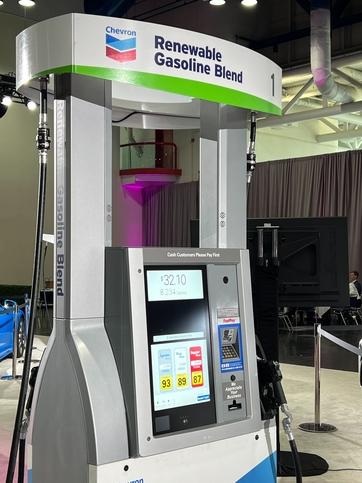
The Fossil Fuel Industry Wants You to Forget about Climate Change
The story the energy industry was selling at its CERAWeek conference has one planet-sized omission.
6 min read
Transition? What transition?
That was the inescapable sentiment emerging from CERAWeeek, the energy industry's annual "Super Bowl" conference last week in Houston.
Split between the $9,500/ticket Executive Conference with a Who's Who of global energy and an Innovation Agora showcasing the latest clean and fossil energy technologies, CERAWeek is where the fossil fuel industry both puts its friendliest face forward and says the quiet parts out loud.
And what it's saying this year is simple: We're here to stay. Oh, and never mind those ads about sustainability – we're sticking with the drilling and the burning, thanks.
At a time of robust projected growth, it's also saying this increasingly loudly. As CEO of the world's largest oil producer, Saudi Aramco's Amin Nasser is not in the position of needing to pull his punches. So it was no surprise when he told the audience to applause, "We should abandon the fantasy of phasing out oil and gas, and instead invest in them adequately."
No surprise either that he was not alone in this feeling, as Reuters reported:
"Other oil CEOs echoed his view, with Shell's Wael Sawan pointing to government bureaucracy in Europe as slowing needed development. Petrobras CEO Jean Paul Prates said caution should overrule haste. Exxon Mobil CEO Darren Woods also said regulations governing clean fuels have still not been resolved."

So if you were seeing those warm and fuzzy ads from Shell on how it's making good progress toward net zero or Exxon working with the National Renewable Energy Laboratory (NREL) on the "#energytransition" and wondering if maybe, just maybe, oil majors were having a change of heart, well, think again.
The Empire Is Striking Back
On the face of it, bullish statements on oil where the industry has home team advantage aren't exactly the definition of news. Big Oil's gonna Big Oil, right?
But take a step back and it's clear that what's happening in Houston isn't about a few executives saying what's really on their minds, but the industry trying to seize control of both the narrative and course of energy transition worldwide.
In many ways, it's a continuation of the same fight unfolding for over a year in opinion pages, reports, and press releases between the International Energy Agency (IEA) and the oil industry and cartel OPEC. What's at stake here is nothing less than the future of global energy.
Listen to the IEA, and the world is in the midst of a transformational shift from fossil fuels to clean energy, slowly, imperfectly progressing toward the net zero pathways that can help us avert climate catastrophe. In a line that should inspire anyone with a soft spot for life on Earth, the agency's recent World Energy Outlook declares, "We are on track to see all fossil fuels peak before 2030."
OPEC, meanwhile, is selling a vision where the world needs more oil not less, accusing the IEA of vilifying the oil industry and stoking volatility in energy markets. Sure climate is a challenge in an abstract way, but the grown-up response, as Exxon CEO Darren Words would have you believe, is to try to reduce emissions rather than change fuel sources.
Where OPEC and the IEA do agree is in projecting tremendous growth in global oil demand this year. But the two agencies' projections are roughly 1 million barrels per day apart, the biggest gap between them in history. And in each is the start of a path for the planet toward a very different climate future.
With the science clear on the need to halve fossil fuel emissions this decade to have any chance of holding warming to the Paris goals of 1.5 degrees Celsius, this is no abstract exercise. Which story policymakers, investors, business leaders, and more go with will massively determine whether we succeed or fail in this goal.
For a moment, at least, in December, the future seemed to be increasingly lining up with the story Team IEA was telling. The UN's COP 28 climate conference had just wrapped with a decision calling for "Transitioning away from fossil fuels in energy systems, in a just, orderly and equitable manner . . . so as to achieve net zero by 2050 in keeping with the science." Headlines worldwide proclaimed the beginning of the end of fossil fuels, and a historic (albeit still meager) win for climate progress.

The industry, however, never saw it that way. Soon after COP, Saudi Energy Minister Abdulaziz bin Salman was making headlines of his own, claiming the call to transition away from fossil fuels was only one option of many on an à la carte menu.
Four months on, which story wins and which path we take is still very much up for grabs. Even as the pace of warming continues to leave scientists simply slack-jawed, the energy transition that even a year ago felt much more assured seems to be hitting one speed bump after another. Rising costs are forcing wind developers to pause major projects. US oil production is at an all-time high, and the climate movement could be forgiven for thinking it's living through its own "Empire Strikes Back" moment.
The Industry's Existential Shrug
One of the most puzzling features of the CERAWeek calls to reset expectations for energy transition and return to fossil investment is what they leave out: The cost to the planet.
As the Intergovernmental Panel on Climate Change (IPCC) reminded the world in 2022, any new oil and gas field development will take the planet well past livable limits for global warming.
So how has the industry responded? With a shrug. Rather than reduce production, the industry is racing to expand it, with plans to boost oil and gas by 2030 to levels perhaps double what the planet can handle and keep warming around 1.5 degrees Celsius.
Not that the industry doesn't have a climate plan. But it's a marketing plan, rather than an operations plan.
As Carbon Tracker details in a new report, oil majors are happy to profess their support for the goals of the Paris Agreement. (The optics are great.) But none are actually working to align their operations and reduce emissions at the level necessary to meet these goals. Of the 25 publicly listed oil companies graded by the report, none received passing grades, with BP being the best of the bunch. With a D.

So if there's anything to be grateful for in the industry's mob enforcer candor at CERAWeek, it's the clarity that the fossil fuel companies that brought us climate change won't be part of the energy transition we need to survive it. They won't be part of the race to halve emissions this century. And judging by the American Petroleum Institute's attacks on the Biden Administration's LNG export permitting pause and clean cars rules show, they'll fight transition every step of the way. You can't help wondering what kind of planet they expect to live on.
After all, the industry is right to be wary of the story the IEA and others are telling. Because there is another way forward. After all, more energy from the sun strikes the Earth in one hour than humanity uses in an entire year. As for the cost of harnessing all that abundant energy, today, solar is the cheapest form of electricity in most of the world. And renewables account for about 90% of new energy installed today.
Which is all a way of saying that the story we tell matters. Yes, the industry is having its moment. But what happens with our planet is still up to us. And maybe we can't expect them to change their business models. But we can expect them to get out of the way.
What many don't know is that each year, we're paying the same fossil fuel companies driving climate devastation billions in subsidies. Take action and tell G20 leaders to end the handouts to the corporations destroying our planet.




